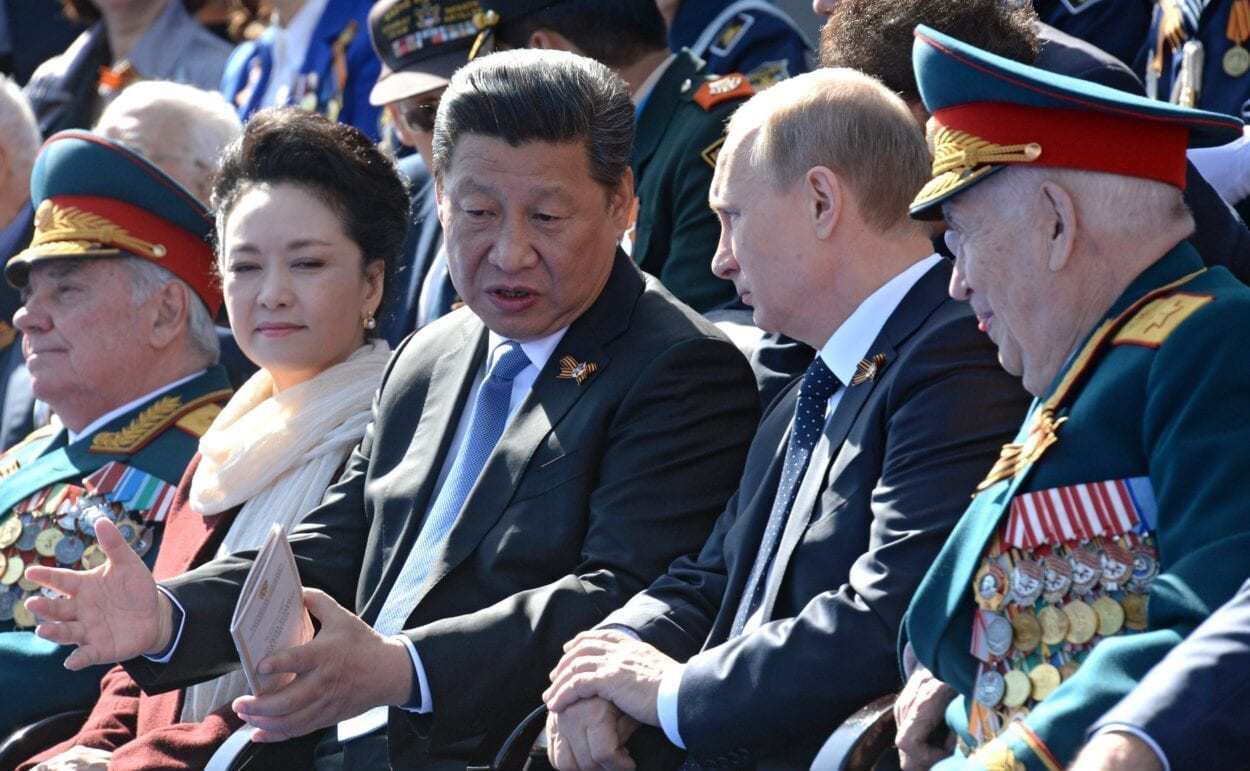After initially rejecting China’s 12-point peace plan to bring the war in Ukraine to an end, Russian President Vladimir Putin welcomed the proposal during a joint press conference with Chinese President Xi Jinping on Tuesday. The Russian leader said that “many of the provisions” put forward in the plan are “consonant with Russian approaches” and could be used as the “basis for a peaceful settlement” when Kyiv and the West are “ready” for it.
The Russian president also reiterated his claim that the West isn’t prepared for peace, however.
“So far, we see no such readiness from their side,” Putin said.
While Putin didn’t endorse the plan in its entirety, his comments were substantially different from those offered by Kremlin spokesman Dmitry Peskov in February. While Peskov said Russia would give the plan the “attention” it deserves, he also said that the Kremlin does not “see any of the conditions that are needed to bring this whole story towards peace.”
For Russia, the only acceptable peace plan is Ukraine’s surrender and the absorption of at least four major regions of Ukraine into Russia.
The Chinese plan for peace was roundly criticized not just by Russia, but also by Western analysts, for its vagueness. The plan also looks to be part of a wider effort to encourage Western nations to accept China’s claims of territorial control over Taiwan. Writing for the Carnegie Endowment for International Peace, Alexander Gabuev noted that the plan was “not aimed at actually ending the war” but at “impressing the developing world and rebutting accusations that Beijing has become a silent accomplice to Moscow.”
The first two points of China’s 12-point peace plan make it quite clear that this isn’t just about Ukraine. In the first point, titled “Respecting the sovereignty of all countries,” the Chinese government proposes that “universally recognized international law” must be “strictly observed,” adding that the “sovereignty, independence and territorial integrity of all countries must be upheld.”
It adds that “all countries, big or small, strong or weak, rich or poor, are equal members of the international community.” Had this very same measure been proposed by the United States, few domestic analysts would have raised an eyebrow. It would likely have been praised as a common-sense proposal necessary for the prevention of war. China, however, would no doubt have objected – and for the simple reason that China and the United States, and the East and the West more generally, have different ideas about what “territorial integrity” means.
For China, territorial integrity means the strict adherence to the One China policy, and the reclaiming of territories that the Chinese Communist Party believes to be inextricable parts of China. This would include both Taiwan and Hong Kong. For Russia, territorial integrity means reclaiming Ukraine and rebuilding the Russian Empire.
The second point in China’s peace plan encourages world leaders to abandon the “Cold War mentality.” This is by no means a new talking point for the Chinese, and while at face value it seems just as unobjectionable as the first point, the implications of simply abandoning that mentality without first securing meaningful change and security guarantees are significant. China’s proposal is predicated on the falsehood that neither China nor Russia pose a threat to humanity, the environment, or global security. The Cold War mentality arose as a result of the aggressive growth of communism, the risk it posed to the people of those countries suffering through it, and the real possibility of an anti-human ideology spreading further West. Today, Russia is unhappy with the West’s constant eastward expansion, and while some might argue that the West provoked this war by purposely expanding NATO’s borders closer and closer to Russia, without agreements from Russia and China to abandon their blatant human rights violations it’s hard to imagine any Western leader blindly agreeing to China’s proposal.
Cold War mentality cannot simply be abandoned when Eastern superpowers continue to enslave and torture ethnic minorities, and President Xi seeks to grow his own country’s power by absorbing territories it claims are already part of China.
China knows that, but the war in Ukraine – and the fact that both Russia and Ukraine want the conflict to come to an end as soon as possible – may be just the catalyst President Xi is looking for. It’s a long shot, sure, but China may just see Ukraine as an opportunity to prove its anti-war credentials. And, in exchange for a peace agreement, the West could theoretically look the other way when the Chinese president orders his military to invade Taiwan. If that happens – and it probably won’t – then risking angering President Vladimir Putin with the peace deal would be worth it. And, as it turns out, Putin is now on board with the plan anyway.
Putin’s sudden U-turn comes after the two world leaders met in Moscow and signed two agreements affirming new “strategic cooperation” between the countries. Following “successful and constructive talks” at the Kremlin, the Chinese president promised that China and Russia would enter a “new era” of trade and economic cooperation together. For Putin, struggling under the weight of Western sanctions, an improved relationship with a country that boasts far greater economic and military strength is a blessing. Accepting China’s peace agreement, even if it doesn’t explicitly accept Russia’s claim to the Donbas and other parts of Ukraine, is the price he must pay.
Perhaps, then, the Chinese president used their recent Moscow meeting to convince Putin that the vague terminology found within the plan can mean anything he wants it to.
Jack Buckby is 19FortyFive’s Breaking News Editor. He is a British author, counter-extremism researcher, and journalist based in New York. Reporting on the U.K., Europe, and the U.S., he works to analyze and understand left-wing and right-wing radicalization, and reports on Western governments’ approaches to the pressing issues of today. His books and research papers explore these themes and propose pragmatic solutions to our increasingly polarized society.

